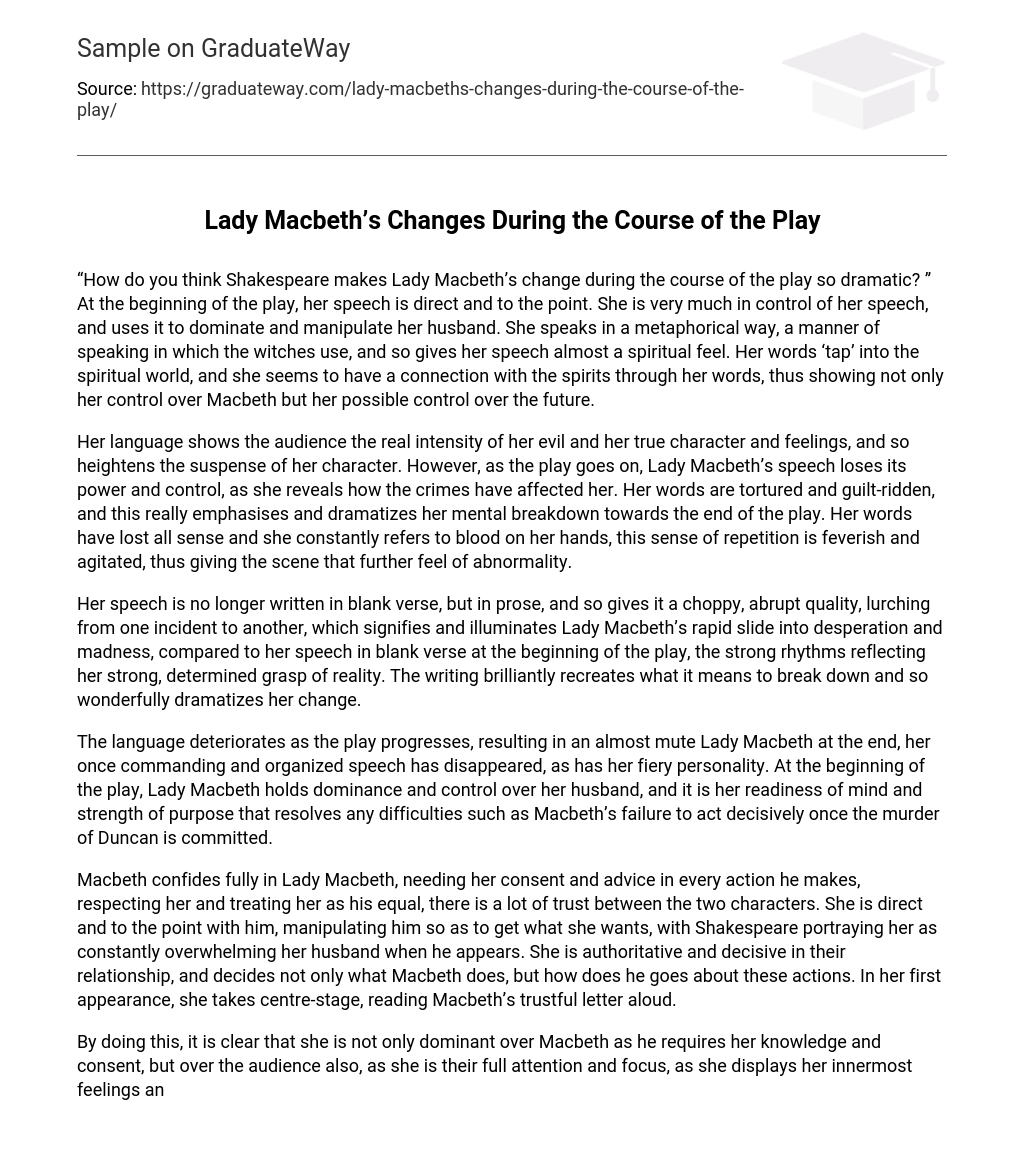Shakespeare’s portrayal of Lady Macbeth’s transformation throughout the play is highly impactful. Initially, her communication style is commanding and concise as she exerts dominance over her husband. This is achieved through her skilled manipulation of language, employing metaphors commonly employed by the witches. Consequently, her words possess a spiritual essence that taps into the supernatural realm, indicating her potential influence not only over Macbeth but also over future events.
Lady Macbeth’s language effectively exposes her evil nature and reveals her true character and emotions, intensifying the suspense surrounding her. However, as the play progresses, her speech becomes less impactful and controlled as she unravels under the weight of her crimes. Her words become tormented and filled with guilt, emphasizing and dramatizing her mental decline by the end of the play. Her speech becomes nonsensical, fixated on the imagery of blood on her hands, creating a frantic and disturbed atmosphere in the scene.
Lady Macbeth’s speech has transitioned from blank verse to prose, resulting in a disjointed and abrupt quality. This abruptness highlights her rapid descent into desperation and madness. In contrast, the earlier blank verse speech demonstrated her firm grip on reality. The writing effectively captures the experience of breaking down and effectively portrays her transformation.
Lady Macbeth’s language and demeanor progressively decline in the play, ultimately rendering her almost speechless. Her previously strong and composed speech as well as fiery personality vanish. Initially, she asserts dominance over her husband and relies on her ability to think quickly and remain determined to overcome obstacles, particularly when Macbeth hesitates after murdering Duncan.
In the portrayal of Lady Macbeth, Shakespeare presents her as a reliable confidante and advisor to Macbeth, earning his admiration and trust. Their bond is marked by reciprocal faith and equality. Yet, Lady Macbeth cunningly manipulates her spouse, leveraging her influence to fulfill her own aspirations. Throughout the play, Shakespeare consistently illustrates her dominance over Macbeth, exerting authority above him. She not only dictates his actions but also provides guidance on how to execute them. During her initial appearance, Lady Macbeth seizes control of the situation by exercising power through publicly reciting the letter handed to her by Macbeth.
By showcasing Lady Macbeth’s dominance over both Macbeth and the audience, Shakespeare portrays her as the central and captivating character in the play. Through her reliance on Macbeth’s knowledge and consent, she exerts control over him. Additionally, by openly displaying her innermost thoughts and emotions, she captivates the attention of the audience. In skillfully depicting Lady Macbeth’s journey to forsake her femininity and compassion, Shakespeare elevates her to a role more prominent than even that of Macbeth himself.
Despite previously dominating and controlling her husband, Lady Macbeth’s descent into madness and desperation is even more powerful. She desperately tries to regain her former power and influence. However, Macbeth no longer respects her, calling her his ‘dearest chuck’ and dismissing her. The power balance between them changes, as Macbeth becomes strong and destructive while Lady Macbeth seems caring and vulnerable. This is the most feminine we have seen her in the play.
And it is this that makes her transformation so impactful. The controlling, dominant, and resolute Lady Macbeth is no more, instead replaced by a fragile and sensitive woman. All the characteristics and traits we had associated with Lady Macbeth have disappeared as we witness her struggle with her sanity. She has relinquished the masculine power that she had been striving for throughout her life. Lady Macbeth could be depicted as a witch-like figure, as she possesses an intimate knowledge of these ‘murdering ministers’ that goes beyond what could be learned solely from a letter.
Lady Macbeth exhibits a strong desire for the devil and succumbs to a satanic force. She yearns to acquire supernatural abilities. Lady Macbeth’s use of metaphoric language, similar to that of the Weird Sisters, enables her to influence physical events, including foreseeing the future. This creates a connection between Lady Macbeth and the Weird Sisters. Initially, Lady Macbeth demonstrates her extraordinary strength by meticulously planning the murder and cunningly smearing the victim’s blood onto the guards.
However, Lady Macbeth’s morality emerges again when she confesses that she couldn’t have gone through with the murder because the victim looked like her sleeping father. As Lady Macbeth breaks down and is consumed by remorse for her role in unleashing evil, Macbeth becomes more evil and dominant. This reversal of roles is a dramatic change, as Macbeth no longer shares his thoughts with Lady Macbeth, isolating her. Now, Macbeth embodies evil while Lady Macbeth becomes the victim.





